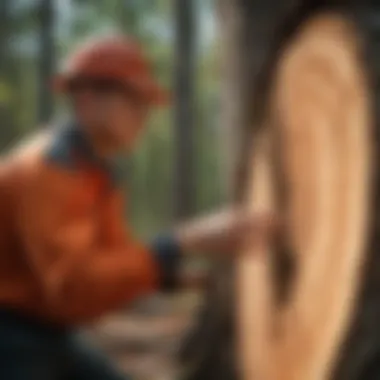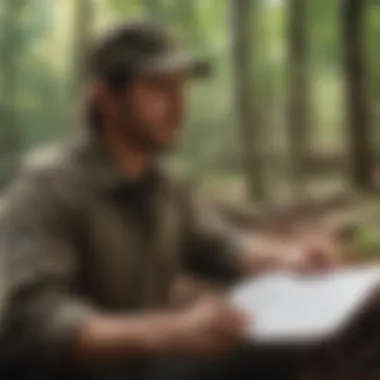Unlocking Michigan DNR Careers: A Path to Conservation Excellence


Forest Management Techniques
- Wildlife Habitat Preservation: In the vast realm of forest management, the conservation of wildlife habitats stands as a cornerstone. By employing strategic measures, such as preserving natural vegetation and creating wildlife corridors, professionals in forestry contribute to maintaining biodiversity and safeguarding the intricate ecosystems that rely on specific habitats for survival. The meticulous planning and execution involved in wildlife habitat preservation underscore the dedication and expertise required in forestry and wildlife management.
- Sustainable Logging Practices: Sustainable logging practices are imperative in ensuring the long-term viability of forests and timber resources. From selective logging techniques that minimize disturbances to ecosystem-based management strategies, the forest industry is continually evolving to adopt sustainable harvesting methods that strike a delicate balance between resource extraction and ecosystem resilience. By embracing sustainable logging practices, forestry professionals demonstrate a commitment to environmental stewardship and responsible natural resource management.
- Fire Prevention Measures: Forest fires pose a significant threat to woodlands, jeopardizing not only the ecological balance but also human lives and property. Implementing effective fire prevention measures, including controlled burns, firebreak construction, and early detection systems, is crucial in mitigating the impact of wildfires and safeguarding forested areas. Forestry experts play a pivotal role in fire prevention efforts by devising comprehensive strategies to reduce fire risks and enhance forest resilience against potential wildfire incidents.
- Ecosystem Restoration Initiatives: Overarching ecosystem restoration initiatives encompass multifaceted approaches aimed at revitalizing degraded lands and promoting sustainable ecosystems. Through reforestation projects, invasive species management, and habitat restoration efforts, forestry professionals work tirelessly to reverse environmental degradation and enhance ecosystem services. The proactive measures undertaken in ecosystem restoration underscore the proactive and innovative solutions forestry experts deploy to address environmental challenges and foster healthy, resilient landscapes.
Introduction
In this article, we will delve into the exciting world of Michigan Department of Natural Resources (DNR) careers, a topic brimming with promise and environmental significance. Michigan DNR offers a plethora of career paths tailored for those zealous about conservation and environmental stewardship. Navigating the diverse opportunities within Michigan DNR is like embarking on a journey through the heart of nature's preservation, attracting individuals keen on making a tangible difference in the realm of natural resources.
Overview of Michigan DNR
The Michigan Department of Natural Resources stands as a beacon of environmental conservation in the region, entrusted with the monumental task of safeguarding the state's ecological heritage. From managing state parks to overseeing wildlife habitats, Michigan DNR functions as a pivotal entity in maintaining the delicate balance between human activities and nature's resilience. Understanding the core functions and responsibilities of Michigan DNR provides a foundational insight into the intricate web of efforts dedicated to preserving Michigan's natural landscapes.
Importance of Careers in Natural Resources
Careers in natural resources play a vital role in shaping the environmental landscape, reflecting a commitment to sustainability and biodiversity conservation. Embracing a career in this field signifies a dedication to safeguarding fragile ecosystems and wildlife populations, contributing to the greater good of our planet's health. Through a career in natural resources, individuals have the unique opportunity to merge passion with profession, fostering a harmonious coexistence between human development and ecological integrity. The importance of these careers extends far beyond personal fulfillment, encompassing a broader mission of environmental stewardship and long-term sustainability.
Forestry Careers
Forestry Careers offer individuals the opportunity to immerse themselves in the management and protection of forests, ensuring their sustainable use for current and future generations. The benefits are manifold, ranging from the ability to work in diverse outdoor settings to actively contributing to the conservation of natural habitats. Considerations about Forestry Careers include the need for specialized knowledge in forest ecology, tree species identification, and sustainable forestry practices. Professionals in this field must also possess strong problem-solving skills to address complex issues related to forest health and ecological balance.
Forester
A Forester holds a crucial position within the forestry sector, tasked with overseeing various aspects of forest management and conservation. In this role, a Forester is responsible for conducting forest inventories, developing land management plans, and implementing silvicultural practices to maintain forest health. The significance of a Forester lies in their ability to ensure the sustainable utilization of forest resources while promoting biodiversity and ecosystem resilience.
To excel as a Forester, individuals must possess a solid understanding of forestry principles, including tree growth patterns, soil composition, and wildlife habitat requirements. Foresters actively engage in timber harvesting operations, reforestation initiatives, and wildfire prevention efforts to safeguard forest ecosystems. By collaborating with stakeholders and utilizing advanced technology such as Geographic Information Systems (GIS), Foresters contribute significantly to the long-term viability of forests.
Forest Technician
The role of a Forest Technician complements that of a Forester, with a focus on fieldwork and data collection to support forest management activities. Forest Technicians play a vital role in conducting tree surveys, monitoring wildlife populations, and assessing forest health indicators. Their work directly contributes to the development of forest management plans and the implementation of sustainable forestry practices.
Forest Technicians work closely with Foresters to gather essential data on tree species distribution, timber volume, and invasive species presence. This information guides decision-making processes aimed at maintaining forest productivity and environmental integrity. By utilizing specialized tools such as clinometers and increment borers, Forest Technicians provide valuable insights into the ecological dynamics of forest ecosystems.
Conservation Scientist
In the realm of Forestry Careers, Conservation Scientists are instrumental in conducting research and analysis to inform conservation strategies and policy decisions. These professionals focus on studying the ecological impact of human activities on forest ecosystems and developing mitigation measures to enhance environmental resilience.
Conservation Scientists employ a multidisciplinary approach to investigate deforestation trends, biodiversity loss, and climate change effects on forest health. By utilizing advanced modeling techniques and remote sensing technologies, they assess ecosystem dynamics and promote conservation practices that ensure the long-term sustainability of forests. Their in-depth knowledge contributes to the protection of biodiversity hotspots and the implementation of adaptive management strategies in forest conservation.
Wildlife Management Careers
Wildlife Biologist
Wildlife biologists are at the forefront of wildlife conservation and research in Michigan DNR. They study animal behaviors, habitats, and populations to develop effective conservation strategies. Wildlife biologists conduct field surveys, analyze data, and work closely with other conservation professionals to implement wildlife protection initiatives. Their work is crucial in informing policy decisions, mitigating human-wildlife conflicts, and promoting biodiversity conservation. The role of a wildlife biologist is dynamic, requiring a blend of fieldwork, research, and advocacy to protect Michigan's diverse wildlife species.
Fisheries Manager
Fisheries managers are vital in overseeing the sustainable management of aquatic ecosystems and fish populations in Michigan DNR. They focus on monitoring fish populations, implementing habitat restoration projects, and regulating fishing practices to ensure resource sustainability. Fisheries managers collaborate with scientists, policymakers, and stakeholders to develop fishery management plans that support ecological balance and recreational fishing opportunities. Their work contributes to preserving aquatic biodiversity, promoting recreational fishing experiences, and fostering a connection between people and Michigan's diverse aquatic environments.


Game Warden
Game wardens play a critical role in enforcing wildlife conservation laws and regulations in Michigan DNR. They are responsible for monitoring hunting and fishing activities, investigating wildlife crimes, and educating the public on wildlife conservation practices. Game wardens patrol designated areas, respond to conservation emergencies, and collaborate with law enforcement agencies to uphold wildlife protection laws. Their presence helps deter poaching, protect endangered species, and enhance overall wildlife conservation efforts in Michigan. Game wardens embody a commitment to safeguarding natural resources and upholding ethical practices in outdoor recreation.
Environmental Education Careers
Environmental education careers play a crucial role in shaping future generations to become stewards of our natural resources. In this comprehensive exploration of Michigan DNR careers, the focus on Environmental Education Careers highlights the pivotal role of educators and naturalists in fostering environmental awareness and conservation efforts. This section sheds light on the significance of imparting knowledge about ecosystems, sustainability, and biodiversity to inspire a deeper connection with nature.
Environmental Educator
Environmental educators are instrumental in delivering curriculum-based environmental lessons to students of all ages. They craft engaging programs that emphasize ecological principles, conservation practices, and outdoor experiences. By connecting individuals with nature through hands-on activities and field trips, environmental educators instill a sense of responsibility towards protecting the environment. They serve as catalysts for instilling a sense of wonder and curiosity about the natural world, nurturing the next generation of environmental advocates.
Interpretive Naturalist
Interpretive naturalists bridge the gap between the natural world and people, interpreting the significance of ecological systems and wildlife habitats. They lead nature walks, deliver informative talks, and engage visitors in interactive learning experiences. Through their expertise, interpretive naturalists foster an appreciation for local flora and fauna, promote conservation ethics, and facilitate meaningful connections with the environment. Their passion for sharing knowledge and creating immersive nature encounters enriches the public’s understanding of the delicate balance within ecosystems.
Law Enforcement Careers
Law enforcement careers within the Michigan Department of Natural Resources (DNR) play a vital role in upholding conservation laws and regulations to protect the state's natural resources. These careers are pivotal in ensuring compliance with wildlife protection laws, preventing illegal activities such as poaching, and educating the public on environmental conservation.
Law enforcement officers within the DNR primarily focus on enforcing hunting, fishing, trapping, and boating regulations to maintain ecological balance and preserve wildlife populations. Their duties include monitoring and investigating wildlife-related violations, engaging in stakeouts to apprehend offenders, and collaborating with other agencies to combat environmental crimes.
The significance of law enforcement careers in environmental conservation cannot be overstated. Conservation officers and wildlife enforcement officers serve as frontline defenders of Michigan's natural heritage, safeguarding vulnerable species and habitats from exploitation and harm. By deterring unlawful activities and promoting ethical behavior in outdoor recreation, these professionals contribute significantly to the sustainable management of the state's ecosystems.


Conservation Officer
A Conservation Officer within the Michigan DNR is responsible for enforcing wildlife protection laws, overseeing hunting and fishing activities, and conducting public outreach on conservation practices. These officers patrol natural areas, identify potential violations, and educate individuals on the importance of preserving ecological integrity. Conservation Officers often work closely with local communities to address environmental concerns and engage in conservation initiatives.
Conservation Officers require extensive knowledge of wildlife biology, law enforcement procedures, and conflict resolution techniques. Strong communication skills, physical fitness, and critical thinking abilities are essential for success in this role. By enforcing conservation regulations and promoting ethical hunting practices, Conservation Officers contribute significantly to biodiversity conservation and environmental sustainability.
Wildlife Enforcement Officer
Wildlife Enforcement Officers, also known as Game Wardens, specialize in investigating wildlife-related crimes, enforcing conservation laws, and promoting environmental education. These officers play a crucial role in combatting illegal hunting, trafficking of protected species, and habitat destruction. They conduct field patrols, assist in wildlife rehabilitation efforts, and collaborate with law enforcement agencies to prosecute offenders.
Wildlife Enforcement Officers must possess a deep understanding of wildlife management strategies, legal frameworks governing environmental protection, and wildlife forensics techniques. Their passion for wildlife conservation, combined with rigorous training in law enforcement, equips them to effectively monitor and safeguard Michigan's diverse ecosystems. By monitoring wildlife populations, enforcing anti-poaching laws, and raising awareness about conservation practices, Wildlife Enforcement Officers help preserve the state's natural heritage for future generations.
Support and Administrative Careers
Support and Administrative Careers play a pivotal role within the Michigan Department of Natural Resources (DNR), serving as the backbone that ensures the efficient operation of various conservation and environmental initiatives. These careers form the essential framework that supports and facilitates the implementation of DNR's wide-ranging projects and programs. Administrative professionals handle crucial tasks such as maintaining records, managing communications, coordinating schedules, and providing vital administrative support to different departments within the organization. IT Specialists, on the other hand, contribute significantly to the technological infrastructure of Michigan DNR, ensuring seamless operations through their expertise in managing and maintaining technological systems. Their role in optimizing IT resources aligns with the overall goal of enhancing organizational efficiency and effectiveness.
Administrative Assistant
Administrative Assistants are integral members of the Michigan DNR workforce, playing a key role in streamlining administrative processes and ensuring the smooth functioning of day-to-day operations. They are responsible for handling correspondence, arranging meetings, preparing reports, and performing various clerical tasks that contribute to efficient workflow within the department. Administrative Assistants act as the first point of contact for inquiries and play a crucial role in maintaining communication channels between internal and external stakeholders. Their organizational skills, attention to detail, and ability to multitask are essential in supporting the diverse administrative needs of Michigan DNR.
IT Specialist
IT Specialists are indispensable assets within Michigan DNR, responsible for overseeing the organization's technological infrastructure, cybersecurity measures, and software applications. Their expertise in computer systems and network administration ensures that Michigan DNR operates with cutting-edge technology to achieve its conservation and environmental protection goals. IT Specialists also provide technical support to staff, troubleshoot issues, and implement innovative solutions to enhance the department's IT capabilities. By staying abreast of the latest technological advancements, IT Specialists contribute to the seamless integration of technology into Michigan DNR's conservation efforts.
Conclusion
The Conclusion section plays a dual role in this article – it not only consolidates the vital information dispersed throughout the preceding sections but also acts as a call to action, prompting readers to reflect on the wealth of possibilities awaiting them within Michigan DNR. By distilling the key takeaways and reiterating the enriching prospects inherent in various roles like forestry, wildlife management, and environmental education, the Conclusion transforms mere information into a compelling narrative of opportunities and aspirations. It serves as a gateway to a world where passion converges with profession, where dedication merges with impact, reaffirming the transformative potential of a career in Michigan DNR.
Closing Thoughts
This section transcends mere rhetoric; it is a heartfelt exhortation to embrace the diverse, challenging, and profoundly rewarding career paths that Michigan DNR unfurls before passionate environmental enthusiasts. It beckons individuals to heed the call of conservation, to immerse themselves in the vibrant ecosystem of opportunities that Michigan DNR offers, and to become stewards of nature, champions of sustainability, and guardians of Michigan's natural heritage. The Closing Thoughts exude a sense of urgency and possibility, paving the way for a new generation of professionals committed to safeguarding the planet's ecological riches, one career choice at a time.



